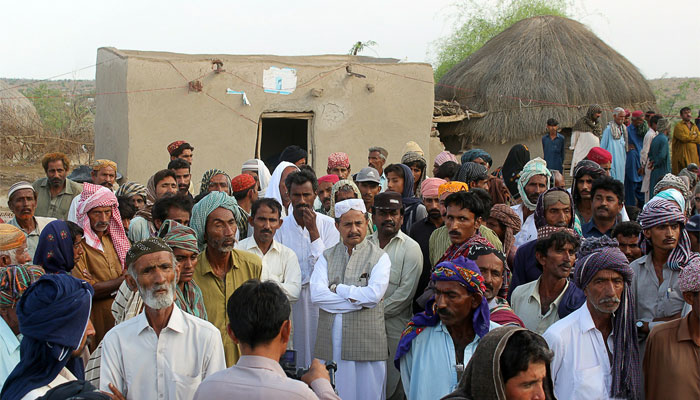Pakistani mourners gather on April 12, 2015 for funeral prayers of construction workers who were killed by Baluch Liberation Front (BLF) , an armed group that wants the Baluchistan province to be "liberated" from the rest of Pakistan, in Mithi, a town in Sindh province. AFP
AFP/Quetta
Pakistani paramilitary forces have killed at least 13 members of an insurgent group who shot dead 20 construction workers in the restive southwestern province of Baluchistan, officials said Monday.
Gunmen killed 20 labourers at point blank range on Friday evening in Baluchistan, after identifying them as migrant workers from elsewhere in the country, an attack claimed by the Baluch Liberation Front (BLF) separatist group.
Immediately following the killings, security forces launched a search operation in the barren mountainous area and have so far killed 13 militants, with the fighting ongoing.
"Security forces have killed at least 13 militants who killed the labourers," a spokesman for Pakistan's paramilitary forces told AFP.
The spokesman said one BLF commander was among those killed, and another of the group's leaders was captured alive.
Provincial home secretary Akbar Hussain Durrani confirmed the militant death toll.
The group, which claimed Friday's raid on the labour camp in Turbat district of Baluchistan, regularly attacks migrant workers and government installations.
The BLF gained greater international recognition after kidnapping American UNHCR worker John Solecki from Quetta on February 2009. Solecki was later released on "humanitarian grounds".
Friday's incident occurred around 1,000 kilometres (650 miles) southwest of Quetta, the provincial capital of Baluchistan.
Resource-rich Baluchistan is the largest of Pakistan's four provinces, but its roughly seven million inhabitants have long complained they do not receive a fair share of its gas and mineral wealth.
Rebels began their fifth insurgency against the state in 2004, with hundreds of soldiers and militants killed in the fighting.
Pakistan accuses neighbouring India of funding and arming the rebels -- a charge some analysts say is payback for Pakistan's interference in Kashmir.
The desperately poor province is also riven by sectarian strife and Islamist violence in its northern Pashtun belt, with middle-class Baluch increasingly viewing independence as their only hope for a more liberal and secular state.

